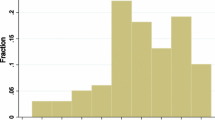The improvement of teacher evaluation is an important theme in current public school reform efforts. One change, suggested by a number of researchers, is to gather more lines of evidence or perspectives of teacher performance for decision making. Student views, commonly used in higher education, are advocated as one data source about teacher quality. Although it is clear that students of all ages can provide some perspective on teacher performance, substantial questions remain about using the views of young pupils.
The purpose of this study was to empirically examine a sample of student reports of teacher performance from kindergarten through second grade. The analysis used procedures developed for student rating forms in higher education. The objective was to advance understanding and practice about effective teacher evaluation, specifically in the use of pupil report data.
Similar content being viewed by others
References
Aleamoni, L. (1981). In J.Millman (Ed.), Handbook of teacher evaluation. Beverly Hills: Sage.
Amatora, M. (1954). Teacher rating by younger pupils. Journal of Teacher Education, 5, 149–152.
Bennett, S.K. (1982). Student perception of an expectation for male and female instructors: Evidence relating to the question of gender bias in teaching evaluation. Journal of Educational Psychology, 74, 179.
Benninga, J., Thornburg, K., & Gursky, T. (1981). Selected attitudes of teachers and student perceptions of instruction at the primary level. Paper presented at the International Congress on Early Childhood Education, Tel Aviv, Israel.
Centra, J.A. (1980). Determining faculty effectiveness. San Francisco: Jossey-Bass.
Darling-Hammond, L., Wise, A.E., & Pease, S.R. (1983). Teacher evaluation in the organizational context: A review of the literature. Review of Educational Research, 53, 285–328.
Driscoll, A., Peterson, K., Crow, N., & Larson, B. (1985). Student reports for primary teacher evaluation. Educational Research Quarterly, 9, 43–50.
Driscoll, A., Stevens, D., & Peterson, K. (1990). Teacher evaluation in early childhood education: What information can young children provide? Child Study Journal, 20(2), 18–26.
Epstein, J.L. (1985). A question of merit: Principals' and parents' evaluations of teachers. Educational Researcher, 14, 3–10.
Feldman, K. (1976). The superior college teacher from the students' view. Research in Higher Education, 5, 234–288.
Haak, R.A., Klauber, D.A., & Peck, R.F. (1972). Student evaluations of teacher instrument II manual. Austin: R&D Center for Teacher Education, University of Texas.
Kauchak, D., Peterson, K., & Driscoll, A. (1985). An interview study of teachers' attitudes toward teacher evaluation practices. Journal of Research and Development in Education, 19, 32–37.
Lortie, D. (1975). Schoolteacher: A sociological study. Chicago: University of Chicago Press.
Marsh, H.W. (1980). Research on students' evaluations of teaching effectiveness: A reply to Vecchio. Instructional Evaluation, 4, 5–12.
martin, E. (1984). Power and authority in the classroom: Sexist stereotypes in teaching evaluation. Journal of Women in Culture and Society, 9, 482–492.
Morine-Dershimer, G. (1976). Teacher judgments and pupil observations: Beauty in the eye of the beholder. Paper presented at the American Educational Research Association, April San Francisco.
Peck, R., Blattstein, R., & Fox, D. (1978). Teacher characteristics that influence student evaluations. Washington, DC: National Institute of Education. (ERIC Document Reproduction Service No. ED 189 058).
Peterson, K. (1984). Methodological problems in teacher evaluation. Journal of Research and Development in Education, 17, 62–70.
Peterson, K., Gunne, M., Miller, P., & Rivera, O. (1984). Multiple audience rating form strategies for evaluation of college level teaching. Research in Higher Education, 20, 309–321.
Peterson, K., & Kauchak, D. (1982). Teacher evaluation: Perspectives, practices and promises. Salt Lake City: Center for Professional Practice, University of Utah. (ERIC Document Reproduction Service No. ED 233 996).
Peterson, K., & Mitchell, A. (1985). Teacher controlled evaluation in a career ladder program. Educational Leadership, 43, 44–47.
Scriven, M. (1981). Summative teacher evaluation. In J.Millman (Ed.), Handbook of teacher evaluation. Beverly Hills: Sage.
Stodolsky, S.S. (1984). Teacher evaluation: The limits of looking. Educational Researcher, 13, 11–18.
Wolf, R. (1973). How teachers feel about evaluation. In E.House, (Ed.), School evaluation, Berkeley: McCutchan.
Author information
Authors and Affiliations
Rights and permissions
About this article
Cite this article
Peterson, K.D., Driscoll, A. & Stevens, D. Primary grade student reports for teacher evaluation. J Pers Eval Educ 4, 165–173 (1990). https://doi.org/10.1007/BF00126125
Issue Date:
DOI: https://doi.org/10.1007/BF00126125




